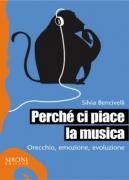Perché ci piace la musica

Is it really true that listening to Mozart makes us and our children smarter? Why is there always classical background music in high-class restaurants? Does opera really make cows give more milk and do sharks like Barry White?
Darwin believed our ancestors used music in courting, and this eventually led to words. Others reckon music has the same evolutionary role as a delicious cream pie: none. Why, then, do we have music, and how exactly does it give us pleasure?
Though scientists have been busy in laboratories and in the field, they propose no unanimous conclusion as yet. From Neanderthal to Metallica, from Pythagoras to neuroscience, this book covers the state of the art in research about our relationship with music, and ends up depicting the birth of a new, extremely fertile and exciting science.
Studies of music and the brain have recently attracted intense interest leading to the success of recent books by Daniel J. Levitin, John M. Ortiz, Aniruddh D. Patel, Oliver Sacks, Michael H. Thaut, and others. Bencivelli’s distinctive contribution is a broad and inclusive approach, and an easy writing style intended to introduce non-specialist readers to the ways scientists formulate questions and look for answers in this fascinating field.
Silvia Bencivelli is an Italian freelance medical and science journalist. Since 2005 she has been editor and host of the daily science news radio program Radio3 Scienza; more recently she became a correspondent for Cosmo, a TV science program. She was an Armenise-Harvard Fellow and was awarded the Tommassetti prize for science journalism in 2010